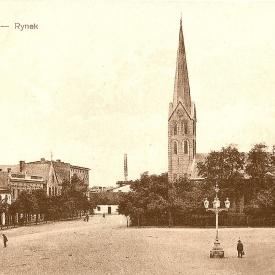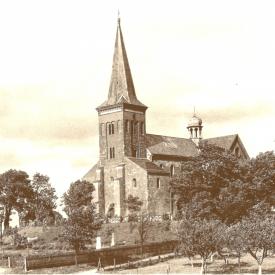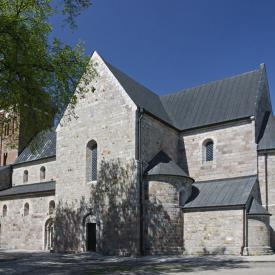Churches in Kruszwica
ST. VITUS CHURCH (non-existent)
The oldest Christian church in Kruszwica, situated outside the town walls was St. Vitus Church from the second part of the 10th century. Some researchers claim that it was a cathedral and the seat of bishop until the reign of Mieszko II. According to some chronicle sources, it was a magnificent, richly ornamented and well-equipped stone basilica with colourful stained-glass windows, decorative clay floor (probably made in workshops outside Kruszwica’s town walls) and the roof made of lead sheets.
The oraculum chapel, mentioned in Boguchwal’s Chronicle, was also dedicated to St. Vitus and it took on the role of the parish church after the fall of the basilica. Some source materials prove the existence of 6 town prebends of St. Vitus basilica in the 13th century, and the duke Siemomyslaw’s document of 1268 is signed by Piotr and Jan, 2 canons, which confirms, against many opposite opinions, that the church was actually a cathedral.
ST. STANISLAUS CHURCH (non-existent)
A wooden church dedicated to St. Stanislaus, built (probably by priest Wilamowski) between 1460-1470 near the Goplo crossing and a custom house, survived only until 1580. While a water supply system was being built in 1934, some archaeological research discovered the foundations of the church and some remains of the adjacent cemetery.
ST. PETER CHURCH, LATER SS PETER AND PAUL COLLEGIATE CHURCH
This church (as a part of Hirsau Congregation) was perhaps founded by Boleslaw the Wrymouth and built in the first decades of the 12th century. The Romanesque stone basilica with 3 naves and a transept was erected on the east shore of Lake Goplo. In the first half of the 12th century, it was recognized as a cathedral and it may have been the seat of bishop. There was a school here in the 13th century. Some source materials mention the names of scholastics: Marcin (1227), Pawel (1233), Henryk (1258-1266) and Teodoryk (1277-1301).
Having been renovated for several times, this well-preserved collegiate church is now a true gem of the Romanesque architecture.
In 1970, the church was awarded the title of Minor basilica by Pope Paul VI on the initiative of Cardinal Stefan Wyszynski. The Pope called the church “the famous witness of the history of the esteemed Polish nation”, which proved the special status of the church.
You are invited to visit the collegiate church and find out its history and numerous titbits of the church.
(Board no. 11).
ST. GOTTHARD CHURCH (non-existent)
The church and its cemetery were built on the east shore of Lake Goplo at the lake crossing near the intersection of the route to Pomerania and the east-west route (neighbourhood of today’s amphitheatre). The church may have been founded by Boleslaw the Curly. The dedication to St. Gotthard was popular for hospital churches, which served as shelter for travellers, the elderly and the ill. The church belonged to the town prebends of St. Vitus collegiate.
ST. CLEMENT CHURCH (non-existent)
St. Clement church (Pope Clement I, who converted Slavs to Catholicism) was a parish church for the market town and the charted town. It was situated in the north-east frontage of the market square. According to some archaeological research, the church was surrounded by a cemetery from the second half of the 13th to the 16th century. The church was not restored at all so it gradually fell into ruin and was finally demolished in 1828.
ST. THERESE OF THE CHILD JESUS PARISH CHURCH
The church, designed by Stefan Cybichowski, an architect from Poznan, was built on the initiative of the prelate priest Stefan Schoenborn between 1926 and 1928. The church and its main altar were consecrated on 11th August 1929 during a magnificent local ceremony. Originally meant to be a chapel, this church of modernist and classical aesthetics rises above the north-east frontage of the market square, at the place of the previous St. Clement church. It is built on a Greek cross plan and covered with a dome. It was a support church for the collegiate for a long time. As late as on 27th September 1982, the church was erected as a separate parish by Cardinal Jozef Glemp, the Primate of Poland.






